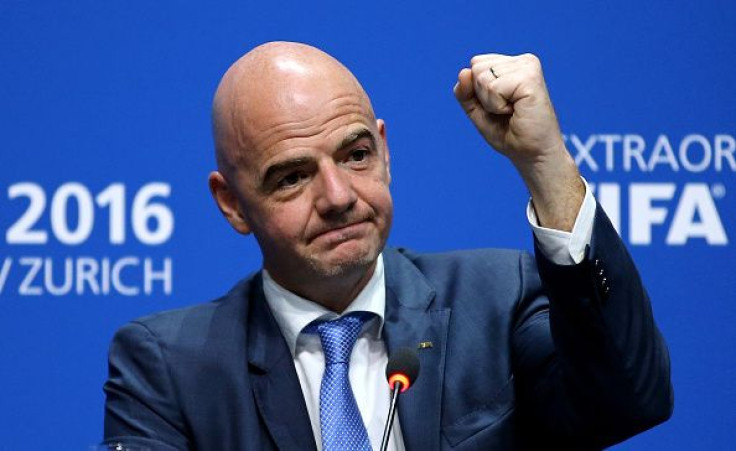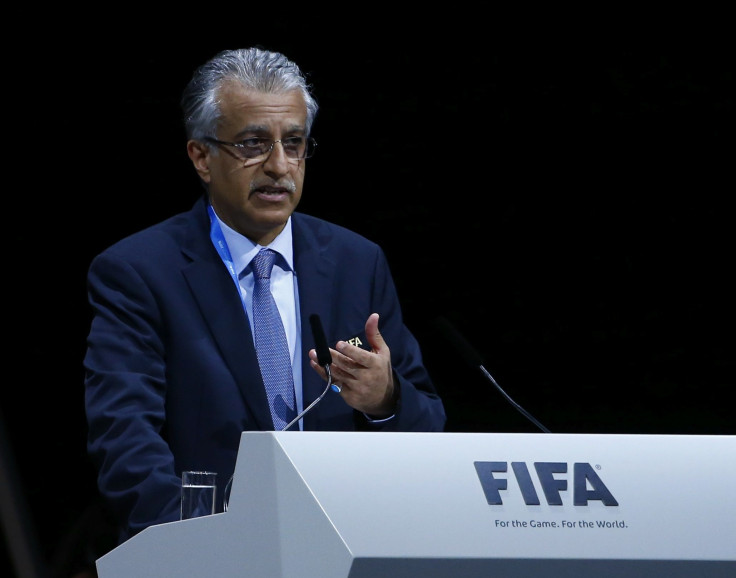FIFA President Election 2016: Gianni Infantino Replaces Sepp Blatter As World Soccer Yearns For Change

After the multiple layers of alleged corruption that peeled away the men in power at world soccer's governing body over the past nine months, the title of FIFA president Friday wound up moving a grand total of just five miles. Gianni Infantino, from the tiny Swiss village of Brig, has succeeded countryman Sepp Blatter, a native of the smaller village of Visp. For Infantino, the task now is to show that there is significantly more distance between the two men than the proximity of their hometowns.
Infantino’s unlikely rise from bureaucrat and charismatic draw host at Europe’s governing body, UEFA, all started in a Zurich hotel last May. Then, on the eve of the FIFA presidential election, a host of the organization’s top officials were hauled off following an investigation led by the FBI.
The bubble in which FIFA had reveled for decades, seemingly immune from the repeated accusations of impropriety, had finally been breached in a way that meant things could never be quite the same again. Blatter would win an unprecedented fifth term as president, but less than a week later he announced his resignation as the wolf moved closer to his door. He still hoped to step away with his dignity intact as the man who had selflessly stewarded the world’s game toward a huge increase in income as the World Cup became a growing global behemoth.
But he would be denied even that. Last September, the Swiss attorney general opened an investigation into a "disloyal payment" allegedly made from Blatter to then-UEFA president Michel Platini.
It was only that final piece of the jigsaw puzzle, just five months ago, that began to bring Infantino to the forefront. At the time it was Platini who was fulfilling his long-held ambition of running for FIFA president. But an eight-year ban, recently reduced to six on appeal, handed to both Platini and Blatter brought those ambitions to an ignominious halt.
With Platini gone, his right-hand man stepped forward. The last time the former UEFA general secretary had run for election he was 18, and the race was to become president of a soccer club near his hometown of Brig. Now he was in the hunt for the biggest job in all of soccer.
He came out on top nearly three decades ago, but the 45-year-old faced a mammoth challenge to win over the votes required from countries skeptical that an official from Europe, where the money and power in soccer has increasingly concentrated, would represent them justly. It had, after all, been the Asian and African voting bloc that had ensured Blatter’s power for nearly two decades.
Adding to the task, Infantino would have to defeat the president of the Asian Football Confederation, Sheikh Salman Bin Ibrahim Al-Khalifa. Despite accusations that he was involved in human rights abuses in the country his family rules, Bahrain, Salman was the favorite heading into Friday’s first Blatter-free election since 1994.

Yet to a large intake of breath at Zurich’s Hallenstadion, Infantino emerged from the first round of voting with a three-vote lead, 88 to 85 over Salman. Both had fallen short of the two-thirds majority of the 207 voting nations required, but Infantino had the edge going into the second round when just a 104-vote majority would be needed.
Infantino’s position was made yet stronger given that the 27 votes for Prince Ali bin al-Hussein and the seven for Jerome Champagne looked likely to go his way. So it went. More than four hours after voting began, Infantino had ascended the throne with 115 votes.
His final pitch to voters perhaps gave an indication of what had swayed the election in his favor, appealing to national associations around the world in a language they likely understood.
"Europe has to do much more," he said. "We have to break down the walls that exist in football. I am committed to do much more. Europe is the continent that forged me, where I was given the chance to work. That’s why, when I speak about figures, I know what I speak about. When I’ve been managing UEFA the revenues have gone up nearly three times, in a time of financial crisis.
"The money of FIFA is your money, not the money of the FIFA president. If we develop football with FIFA’s money the world will look at us and applaud us."
Also sure to have curried favor is Infantino’s plan to expand the World Cup from 32 teams to 40, with seven of the extra places going to non-European countries. As well as rotating the hosting rights between confederations, he has suggested following the plan introduced for the European Championship, whereby multiple countries could host a World Cup. The United States, particularly given the prominent role U.S. Soccer President Sunil Gulati appeared to have on the floor of the congress during the voting process, will surely feel it has a good chance of getting the World Cup in 2026.
But any hope of the U.S. or anyone else of getting the hosting rights for 2022 are unlikely to be aided by Infantino’s election. The tournament has been mired in corruption allegations since it was awarded to Qatar in 2010. It is also set to lead to a change in the soccer calendar with the announcement last year that the event will take place in December, rather than its usual summer berth. Yet speaking last July, when still deputy to Platini, Infantino was happy to abide by the decision.
“If this means that for one year in 150 years of history in football, as our president says, we change the calendar for one year it'll not be the end of the world,” he said, according to the Associated Press. “Of course it is not ideal, but we at UEFA have agreed to this, the associations are happy with it, the vast majority of the leagues are happy with it.”
There is also the fact to consider that Infantino’s former boss, Platini, cast the crucial vote that handed the World Cup to Qatar in the first place. Infantino’s close ties to a man who has been heavily embroiled in the corruption scandal engulfing FIFA is why many believe this election hardly represents the true dawning of a new era.
Indeed, while the focus has been on who the new man in charge at FIFA will be, the greater issue was arguably settled earlier in the day before the seemingly interminable rounds of voting began. With a far greater majority, a huge reform package was passed, notably including that the FIFA president would be limited to three four-year terms. On top of that, the salaries of the president and an elected FIFA council will be disclosed, while there will now be a separation between the council, responsible for strategy, and the general secretariat, which will deal with the financial side of the operation. The promotion of women in soccer will also be enshrined.
Infantino's job is now to implement those reforms and prove that, while it is far from the end of the road toward a new FIFA, it is very much the beginning.
© Copyright IBTimes 2024. All rights reserved.











